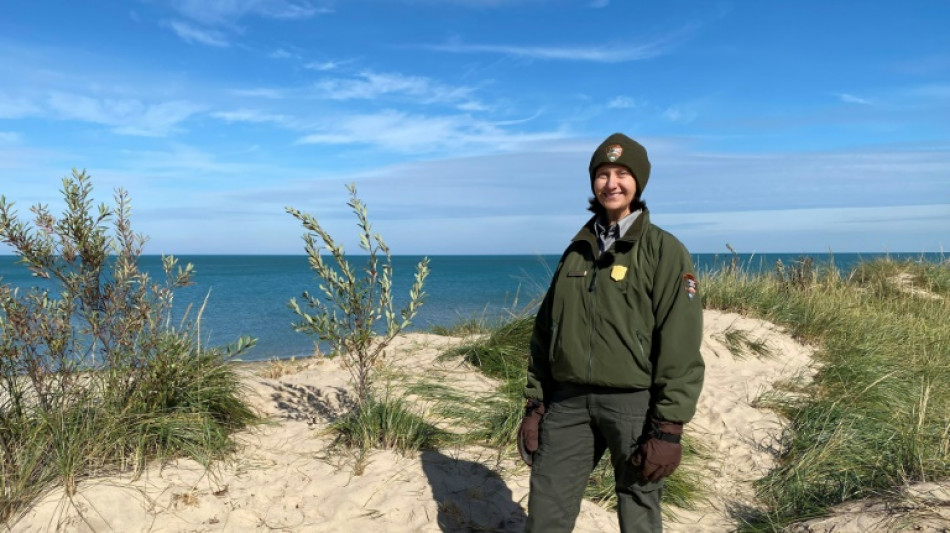
-
 Scotland spoil Italy's T20 World Cup debut with big win
Scotland spoil Italy's T20 World Cup debut with big win
-
Israeli president says 'we will overcome evil' at Bondi Beach

-
 Munsey leads Scotland to 207-4 against Italy at T20 World Cup
Munsey leads Scotland to 207-4 against Italy at T20 World Cup
-
Japan restarts world's biggest nuclear plant again

-
 Bangladesh poll rivals rally on final day of campaign
Bangladesh poll rivals rally on final day of campaign
-
Third impeachment case filed against Philippine VP Duterte

-
 Wallaby winger Nawaqanitawase heads to Japan
Wallaby winger Nawaqanitawase heads to Japan
-
Thailand's Anutin rides wave of nationalism to election victory

-
 Venezuela's Machado says ally kidnapped by armed men after his release
Venezuela's Machado says ally kidnapped by armed men after his release
-
Maye longs for do-over as record Super Bowl bid ends in misery

-
 Seahawks' Walker rushes to Super Bowl MVP honors
Seahawks' Walker rushes to Super Bowl MVP honors
-
Darnold basks in 'special journey' to Super Bowl glory

-
 Japan's Takaichi may struggle to soothe voters and markets
Japan's Takaichi may struggle to soothe voters and markets
-
Seahawks soar to Super Bowl win over Patriots

-
 'Want to go home': Indonesian crew abandoned off Africa demand wages
'Want to go home': Indonesian crew abandoned off Africa demand wages
-
Asian stocks track Wall St rally as Tokyo hits record on Takaichi win

-
 Bad Bunny celebrates Puerto Rico in joyous Super Bowl halftime show
Bad Bunny celebrates Puerto Rico in joyous Super Bowl halftime show
-
Three prominent opposition figures released in Venezuela

-
 Israeli president says 'we shall overcome this evil' at Bondi Beach
Israeli president says 'we shall overcome this evil' at Bondi Beach
-
'Flood' of disinformation ahead of Bangladesh election

-
 Arguments to begin in key US social media addiction trial
Arguments to begin in key US social media addiction trial
-
Dr. Jonathan Spages Expands Diabetes Reversal Practice Across New States, Adds Clinical Team to Meet Growing Demand

-
 Agronomics Limited Announces Net Asset Value Calculation as at 31 December 2025
Agronomics Limited Announces Net Asset Value Calculation as at 31 December 2025
-
UK-Based Vesalic Limited Emerges from Stealth with Landmark Discovery of Potential Non-CNS Driver of Motor Neuron Diseases, including ALS, and Breakthrough Therapeutic and Diagnostic Opportunities

-
 Gotterup tops Matsuyama in playoff to win Phoenix Open
Gotterup tops Matsuyama in playoff to win Phoenix Open
-
New Zealand's Christchurch mosque killer appeals conviction

-
 Leonard's 41 leads Clippers over T-Wolves, Knicks cruise
Leonard's 41 leads Clippers over T-Wolves, Knicks cruise
-
Trump says China's Xi to visit US 'toward the end of the year'

-
 Real Madrid edge Valencia to stay on Barca's tail, Atletico slump
Real Madrid edge Valencia to stay on Barca's tail, Atletico slump
-
Malinin keeps USA golden in Olympic figure skating team event

-
 Lebanon building collapse toll rises to 9: civil defence
Lebanon building collapse toll rises to 9: civil defence
-
Real Madrid keep pressure on Barca with tight win at Valencia

-
 PSG trounce Marseille to move back top of Ligue 1
PSG trounce Marseille to move back top of Ligue 1
-
Hong Kong to sentence media mogul Jimmy Lai in national security trial

-
 Lillard will try to match record with third NBA 3-Point title
Lillard will try to match record with third NBA 3-Point title
-
Vonn breaks leg as crashes out in brutal end to Olympic dream

-
 Malinin enters the fray as Japan lead USA in Olympics team skating
Malinin enters the fray as Japan lead USA in Olympics team skating
-
Thailand's Anutin readies for coalition talks after election win

-
 Fans arrive for Patriots-Seahawks Super Bowl as politics swirl
Fans arrive for Patriots-Seahawks Super Bowl as politics swirl
-
'Send Help' repeats as N.America box office champ

-
 Japan close gap on USA in Winter Olympics team skating event
Japan close gap on USA in Winter Olympics team skating event
-
Liverpool improvement not reflected in results, says Slot

-
 Japan PM Takaichi basks in election triumph
Japan PM Takaichi basks in election triumph
-
Machado's close ally released in Venezuela

-
 Dimarco helps Inter to eight-point lead in Serie A
Dimarco helps Inter to eight-point lead in Serie A
-
Man City 'needed' to beat Liverpool to keep title race alive: Silva

-
 Czech snowboarder Maderova lands shock Olympic parallel giant slalom win
Czech snowboarder Maderova lands shock Olympic parallel giant slalom win
-
Man City fight back to end Anfield hoodoo and reel in Arsenal

-
 Diaz treble helps Bayern crush Hoffenheim and go six clear
Diaz treble helps Bayern crush Hoffenheim and go six clear
-
US astronaut to take her 3-year-old's cuddly rabbit into space


Loss and hope: US park rangers' climate crisis fight
American biologist Laura Brennan describes the coin-sized Karner blue butterfly as "very delicate and graceful" with a "lovely blue" coloring and "just a little speckling of orange."
The species, declared endangered in 1992, used to flourish in Indiana Dunes National Park, where Brennan has worked for two decades.
But the butterfly is now believed to have disappeared entirely from the midwestern US park -- becoming a victim of rising temperatures fueled by human activity, among other stressors.
Brennan and thousands of others in the National Park Service (NPS) are witnessing firsthand the consequences of the climate crisis and struggling to mitigate its impacts.
In picturesque Glacier National Park, near the US-Canada border in Montana, biologist Dawn LaFleur is working to save an at-risk pine species.
"Pretty much everything we do is in light of climate change," she told AFP.
Some battles, like hers, seem winnable. Others are already lost.
In Indiana, the Karner blue butterfly (Plebejus samuelis) is the first known endangered species to have disappeared from an American national park due to global warming.
Though they remain in other places, their loss in the park was "heartbreaking" and "incredibly scary," Brennan told AFP.
It's "terrifying to know how fragile these systems are, and how interconnected everything is, and how little control we have," she said.
- 'Nothing to eat' -
John Gross with the NPS climate change response program told AFP that witnessing the crisis impacts "is hugely emotional" for park rangers.
"It's not a career for many people. It's a way of life," he said, explaining that many employees are the second or third generation in their families to work at the parks.
"So they're very connected to their resources and their parks and care very deeply about it."
Brennan grew up just a few hours from the Indiana Dunes site, which lies along Lake Michigan, some 40 miles (65 kilometers) east of Chicago.
In 2012, her beloved butterflies fell victim to what scientists call a "phenological mismatch."
Due to unusually warm springtime weather, the butterfly larvae emerged ahead of their plant food source, lupine.
"Plants are more reliant on soil temperatures, whereas insects are more reliant on the air temperatures" for seasonal transitions, she explained.
Once emerged, the larvae "have nothing to eat," she said.
"That was the beginning of the end of the Karner story here at Indiana Dunes National Park."
Strenuous efforts were made to restore the butterfly habitat -- as lupines need ample light to grow, major clearing operations were launched, but to no avail.
Models and research on how to make lands more "resilient" against climate change need to be ramped up, she said.
"We need the ability to remove those stressors faster."
- Genetic selection -
In Montana, the whitebark pine has been threatened for years by an invasive fungus known as blister rust, but is increasingly threatened by drought due to early snowmelts and changing weather patterns.
Declared endangered, the trees grow only in the western United States and Canada, and at high altitudes that are particularly sensitive to global warming.
With rising temperatures, mountain pine beetles also risk spreading to those higher altitudes, where they would then attack whitebark pines.
Saving the pines is essential, as their seeds provide food for many species, including grizzly bears and the Clark's nutcracker bird.
For over 20 years, some 1,000 whitebark pines have been replanted every year in Glacier National Park -- a difficult task due to the park's mountainous terrain.
The seeds are chosen after genetic testing for blister rust resistance, and increasingly for drought resistance, LaFleur said.
Having worked in the park for over three decades, she said the work can sometimes leave her feeling "overwhelmed."
"The more we spend in these environments, we realize how fragile they are in terms of the changes being wrought by climate change," she said.
Nonetheless, LaFleur said she remains hopeful about saving the pines.
"We can't change how hot and dry it gets in the summer now, for extended periods of time, we can't control that," she said philosophically.
"So it's more coming up with solutions to be able to adapt and direct our resources... to be able to really address what things we have control over and make a difference that way."
Y.Kobayashi--AMWN


